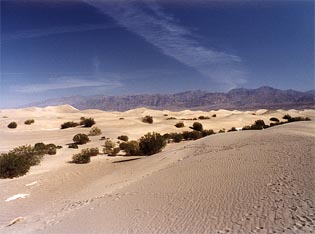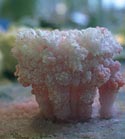|

|
|
|
Issue No. 22 "Geology"
|
Last Updated
|
January 26, 1998
|
|


|
The Mesquite Dunes of Death Valley. Photo
by Benjamin Mendelsohn.
|
|
|

The pink salt crystals below were created by artitst
Jorg
Lenzlinger
for the Exploratorium's "
Turbulent
Landscapes"
exhibition

To create your own salt crystals try
"Crystal
Creations II"
from the "Science Explorer
Out and About" publication.

|
|
Death Valley is well known for its extremes. It is home to
the lowest point in North America but has also had the highest recorded
temperature on the continent (134 degrees Fahrenheit--in the shade--at Furnace
Creek on July 10, 1913. The geological features of Death Valley can not
help but display the effects of these extremes. Strong winds, evaporation,
seismic activity, erosion, and even volcanic eruptions play a role in shaping
Death Valley. There are massive salt deposits, huge craters, flat playas,
and impressive mountains--Telescope Peak towers two miles above the valley
floor. This winter I visited Death Valley and found myself in awe of these
extraordinary geologic wonders. To better understand what I saw, I called
geologist Allen Glazner, coauthor of "Geology Underfoot in Death Valley
and Owens Valley"; his comments (in text and RealAudio) appear throughout
this article.
|
|
|
|
|
|
"Geology in a Land of Extremes"
|

|
|
|
|

Last Issue:
"Project SERENDIP: Searching for Life in the Cosmos"
by Ron Hipschman, "Two Cool Interactive Exhibits: Build a Solar System"
and "Your Weight on Other Worlds."
Issue# 21
About This Issue:
I have been fortunate enough to visit Death Valley four times in the last
few years. It's always been a place for friends and family to get together
and enjoy nature. Each time I've visited, I've learned something new about
the valley and it's great to have the opportunity to share some of those
experiences. I'd like to thank Allen Glazner, coauthor of "Geology
Underfoot in Death Valley and Owens Valley" for his time and his insight
into the geology of Death Valley.
|

|